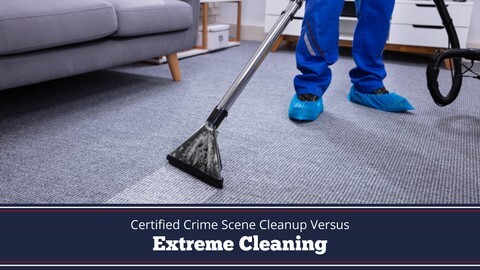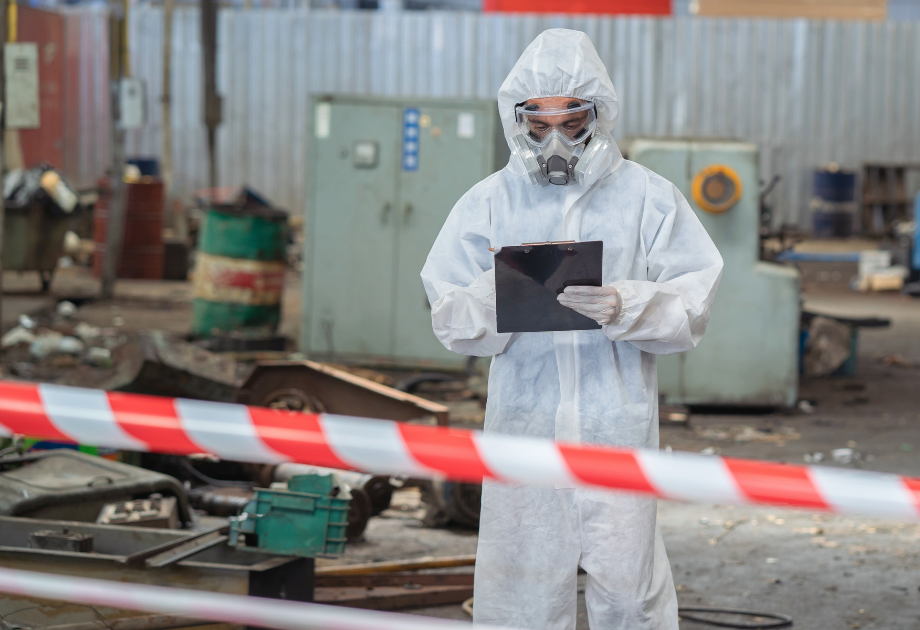Certified Crime Scene Cleanup Versus Extreme Cleaning

Have you ever wondered what happens after the flashing lights fade and the crime scene tape comes down? It’s a world few dare to enter—one where science, empathy, and an iron stomach collide. Certified crime scene cleanup goes far beyond the surface-level scrubbing you might imagine. It’s a profession that demands precision, training, and unwavering commitment to safety.
In this blog, we’ll explore what sets certified crime scene cleaners apart from other extreme cleaners, why certification is essential, and what makes these experts the trusted choice for some of life’s most challenging moments.

What Is Certified Crime Scene Cleanup?
Certified crime scene cleanup involves far more than basic cleaning skills—it’s a specialized service focused on restoring environments affected by traumatic events like homicides, suicides, or unattended deaths. Unlike general cleaning services, certified crime scene cleanup addresses biohazards, ensuring the safety of occupants and compliance with strict regulatory standards.
Certification, such as the IICRC TCST (Trauma and Crime Scene Technician) credential, equips professionals with knowledge about proper cleaning techniques, biohazard disposal, and safety protocols. This expertise reassures clients that the job is handled responsibly, protecting health and legal interests.
How Is Crime Scene Cleanup Different from Other Extreme Cleaning?
Extreme cleaning, while daunting, doesn’t typically involve life-threatening hazards. Think hoarding situations or mold remediation—challenging but not inherently dangerous to human health in the same way biohazards are. Certified crime scene cleaners deal with bloodborne pathogens, bodily fluids, and other contaminants requiring strict adherence to OSHA and EPA guidelines.
For instance, post-crime scene sanitation involves specialized tools like ATP monitors to test for pathogens, as well as personal protective equipment (PPE) to safeguard workers. It’s not just about cleaning; it’s about protecting lives.
Curious about the science behind sanitation? Learn more about the differences between cleaning, sanitizing, and disinfecting in our recent blog.
What Does Certification Entail?
Becoming a crime scene cleaner requires rigorous training. Professionals must learn to handle biohazards, execute decontamination protocols, and navigate the emotional toll of the job. Courses include bloodborne pathogen training and understanding federal regulations. Certification programs test resilience, technical knowledge, and the ability to work in high-pressure environments. These credentials distinguish certified professionals from general extreme cleaners.
The Real Risks of DIY Crime Scene Cleanup
Attempting crime scene cleanup without proper training is like trying to defuse a bomb without knowing which wire to cut. The risks are real, ranging from improper biohazard disposal to significant health hazards. Consider this: bloodborne pathogens can transmit diseases such as HIV and Hepatitis B. Without the right training, cleaners may unknowingly expose themselves and others to infection.
The emotional impact of handling scenes involving trauma is another reason DIY efforts fall short. Certified professionals not only have the technical skills but also the emotional resilience to approach such situations with care and professionalism.
For more on what makes certain messes a biohazard, explore this blog on what makes a mess a biohazard.
Why Is Human Waste Considered a Biohazard?
Human waste contains pathogens that can spread illnesses, making it a high-risk contaminant. For example, urine and feces can harbor bacteria like E. coli or viruses like Hepatitis A. Proper disposal methods and decontamination are necessary to prevent cross-contamination and ensure a safe environment. Certified professionals understand these risks and take every precaution to mitigate them.
Why Is Biohazard Cleanup More Expensive?
The cost of biohazard cleanup companies reflects the extensive training, specialized equipment, and stringent disposal protocols required. Properly handling biohazards demands more than a mop and bucket—it involves HEPA vacuums, hospital-grade disinfectants, and regulated waste disposal. The investment ensures thorough cleaning and compliance with legal and safety standards.

What Makes a Certified Crime Scene Cleaner the Best Choice?
Certification sets professionals apart by demonstrating expertise, reliability, and commitment to safety. Questions like "Can anyone be a crime scene cleaner?" highlight the distinction. The answer is no. Certified cleaners undergo extensive vetting and training to qualify for this demanding role.
Statistically, certified cleanup reduces health risks significantly compared to uncertified methods. With specialists who understand the science behind cleaning, clients gain peace of mind knowing their property is in capable hands.
Why Is Professional Crime Scene Cleaning Necessary?
The need for professional crime scene cleaning lies in protecting public health, adhering to legal standards, and providing emotional relief. Certified professionals restore spaces to safety while navigating complex regulations, ensuring that no trace of the trauma remains. Their work not only protects lives but also brings closure and reassurance to those affected.
For a deeper dive into when crime scene cleanup is necessary, check out our latest blog.
Faith Environmental Crime Scene Cleanup Is Here for You
When it comes to the sensitive task of crime scene cleanup, certification is not optional—it’s the difference between safety and risk, trust and uncertainty. At Faith Environmental Crime Scene Cleanup, our certified professionals are ready to handle the toughest situations with care, compassion, and unmatched expertise.
We’re here for you 24/7, offering services like homicide cleanup, post-crime scene sanitation, and crime scene disinfection. Contact us today to learn more about how we can help you recover the safety and cleanliness of your space.
Happy with the Faith Environmental Crime Scene Cleanup difference? Leave us a five-star review here!

